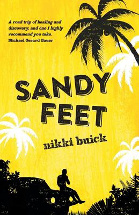Sandy feet by Nicky Buick

University of Queensland Press, 2014. ISBN 9780702253157
(Age: 14+) On an extended holiday along the coast of Northern
Queensland, 16 year old Hunter struggles to get along with his
family in the close confines of car travel and tent camping. His
greatest irritation is Brad, a man who is awkward in his desire to
connect with Hunter as a stepfather, yet unfortunately the harder he
tries, the more the boy rejects him.
There is constant tension within the group, and even everyday
sibling teasing between Hunter and his sister (who has Down
Syndrome) and the difficulty of caring for a young baby whilst
camping threaten to cause heated exchanges within the family. The
children's mother is a troubled soul, barely holding things together
after a suicide attempt and details of a harrowing event involving
the previous husband / father are revealed.
The story seems drawn out, however there is much to appreciate in
the depiction of the characters and their thoughts and feelings are
presented so well that readers will identify and understand them
completely. Hunter's amorous feelings towards a beautiful girl whom
he befriends on the journey are perceptive and authentic, as is his
sense of loss and confusion caused by the absence of his father.
Past trauma has created a situation which is so complex that it is
difficult for Hunters' parents to manage and the pressure leads to a
toxic atmosphere which sometimes appears hopeless. Lack of honest
communication and consideration for the needs of others perpetuate
the painful interactions. A life threatening emergency which befalls
a family member frightens everyone, prompting some unpleasant
portioning of blame, however the crisis management demands support
and cooperation which otherwise would not have occurred.
The suffering of Hunter, his mother, his father and his stepfather
is eased in the story's conclusion, and I liked that the
believability was maintained in the sense that the reader is not
insulted with a 'they all lived happily ever after' conclusion. A
positive and hopeful outcome is presented whilst the difficulties of
everyday life are acknowledged and accommodated. I like this style
and the book will have relevance for adolescent readers 14+ and may
give some comfort to teens who find it difficult to cope with the
behaviours of separated parents and new partners.
Rob Welsh